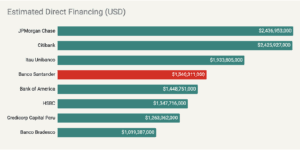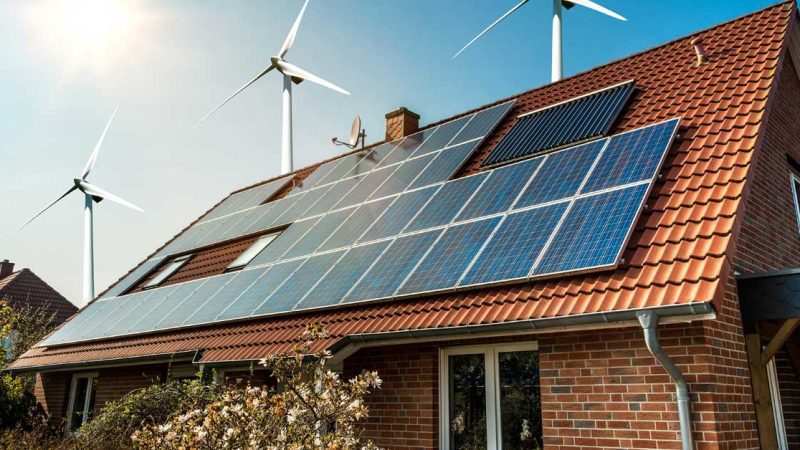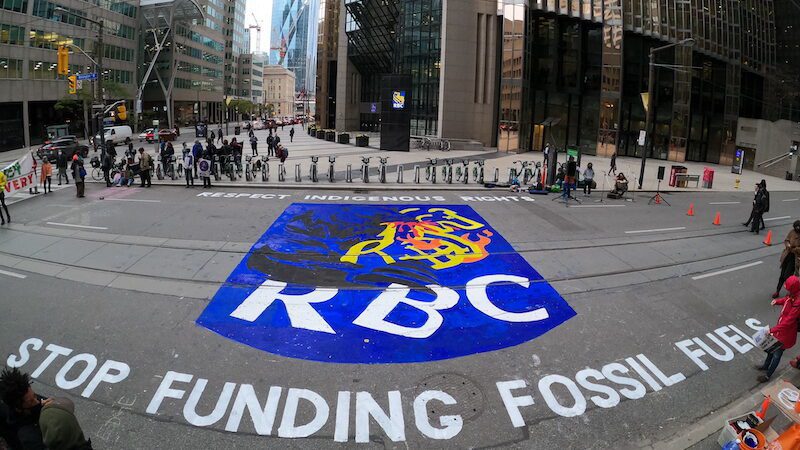Banco Santander is now Europe’s largest financier of oil and gas in Amazonia
March 22, 2024
Lea el comunicado de prensa en español
Leia o press release em português
San Francisco (U.S.), March 22, 2024 – A Stand.earth analysis reveals that Banco Santander has become Europe’s largest financier of oil and gas in the Amazonia despite the global commitment to transition away from fossil fuels. The Spanish bank has financed more than US$ 1.5 billion in the sector of the region between 2009 and 2023, making it the fourth major bankroller worldwide.

The estimated financing (in USD) attributed to the top 8 banks directly financing Amazon oil and gas. Source: Stand Research Group (2024)
The latest Amazon Banks Database update shows that Santander is moving in the opposite direction to energy transition and financial entities in Europe. As the EU seeks to attain global leadership in the climate agenda with environmental policies such as the Green Deal and the Anti-Deforestation Law, and pressure from indigenous leaders and civil society organizations grows, a trend has emerged to restrict the money flow into the sector.
In recent years, Barclays, BNP Paribas, ING and Credit Suisse, and HSBC for example, have implemented an Amazon exclusion policy – a commitment to stop financing activities related to the oil and gas sector, which is a major contributor to the destruction of Amazonia. The scale of Santander’s financing means the bank is playing in the same league as some of the biggest fossil fuel banks in the world, such as JPMorgan Chase and Citibank.
“At a moment when the Amazonia is facing a tipping point, Santander is increasing its financing to oil and gas in the last place on Earth where oil drilling should be happening. This is a wrong direction of growth for a bank that claims to contribute to sustainability. Santander should listen to the Amazonian Indigenous Peoples and scientists, and follow the example of other European banks that have stopped financing the sector in the Amazonia,” said Martyna Dominiak, Senior Climate Finance Campaigner at Stand.earth.
Stand.earth urges all banks to exit Amazon oil and gas by implementing a regional geographic exclusion policy. This appeal to Santander, which is holding its General Shareholders’ Meeting today (March 22), is now gaining public support with a petition signed by over 200,000 people.
Financing linked with deforestation and the violation of Indigenous Peoples’ rights
Dominiak points out that oil and gas exploration in the Amazonia is often associated not only with (legal and illegal) deforestation in the region, but also with the violation of Indigenous Peoples’ rights.
In Peru, the financing of the modernization of Petroperú’s Talara Refinery, in which Santander participated extensively with approximately US$ 1 billion, is an example of the bank’s impact on indigenous peoples and the environment. Talara plans to refine oil from Block 64, an extraction against which the Achuar and Wampis peoples have been resisting for years. The crude is transported through the Norperuano pipeline, which crosses areas recognized by the Ramsar Convention and indigenous territories.
In Brazil, the Spanish bank supported the Parnaíba Complex project, which is the biggest carbon bomb in the Amazonia. Santander also participated in bond issues to finance the integrated Azulão-Jaguatirica project, using the gas from the so-called Campo de Azulão, located in the Amazon River Basin. In February, the Federal Public Prosecutor’s Office in the country requested the suspension of the Eneva’s – company behind the two projects – license to explore gas in the Campo de Azulão.
The company did not take into account neither the presence of indigenous peoples in the region nor the impact of its operations on the territory. In addition to the ethnic groups Muras, Mundurukus and Gaviões who live in the region, a study by CPT (Comissão Pastoral da Terra) shows evidence of the presence of isolated Indigenous Peoples.
The tipping point in the Amazonia becomes imminent with symptoms such as drought and fires that have been affecting the region since 2022. The dynamics of the tipping point can cascade in different parts of the planet. With the upcoming COP16 on Biodiversity (in Colombia) this year and COP30 (in Brazil) in 2025, the regional political debate against extractivism and deforestation becomes relevant. In this context, Santander’s actions raise serious questions about the bank’s commitment to sustainability and innovation, pillars of its corporate policy.
Press contact
Lays Ushirobira – lays.ushirobira@stand.earth / +34 685 20 05 91



